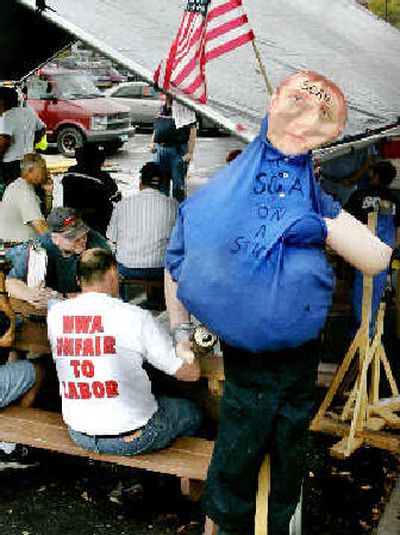Test of unity for mechanics

MINNEAPOLIS — Only five striking Northwest Airlines mechanics have crossed their union’s picket line to return to work. That unity is about to get its toughest test.
With the airline set to begin hiring permanent replacements today, union officials are exhorting members to stay strong in a strike that began Aug. 20. Many mechanics say they will never cross.
“That’s the last thing I’d do, even if I don’t have a job,” said Willie Gresham, a striking mechanic from Atlanta who has been with Northwest for 25 years. “If I go back in, then I go back in with the rest of the guys I came out with.”
He said he’s giving the strike a few more weeks before he begins looking for work elsewhere.
The strike won’t end if Northwest Airlines Corp. begins hiring permanent replacements today, but it will be one more example of how the airline holds the upper hand in talks with the Aircraft Mechanics Fraternal Association, labor experts said.
Some striking workers could still get their jobs back if they cross the picket line; if the union offers to return to work unconditionally, or if it strikes a deal with the airline. But once Northwest hires replacement workers permanently, strikers only have a right to jobs that are open, said Rob Ashmore, a partner at Fisher & Phillips in Atlanta, who has represented airlines in labor disputes.
Many of the strikers’ jobs won’t exist any more anyway. The union’s pre-strike ranks of about 4,400 workers included 800 cleaners, for instance. But Northwest said it has permanently shifted that work to contractors. Northwest’s last offer was to employ only 1,080 mechanics. Northwest on Monday wouldn’t say how many positions it intends to fill now.
The last time an airline replaced workers permanently was in 1986, when Trans World Airlines hired permanent replacements for striking flight attendants.
The strike ended soon afterward, when the Independent Federation of Flight Attendants offered to return to work — something the Northwest mechanics union has not done.
But even the TWA union’s offer to return to work didn’t get them their jobs back. A 1989 Supreme Court decision held that TWA did not have to make room for returning strikers by moving newly hired replacements and veteran flight attendants who crossed the picket line early.
IFFA continued to represent both the returning workers and their permanent replacements until flight attendants voted to switch to the International Association of Machinists in 1997.